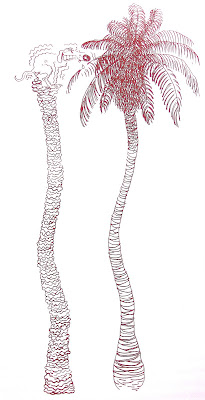Do Leaves Fart in the Sun?

Have you every wondered whether plants make global warming better or worse? In simple terms they take in carbon dioxide from the air and turn into into oxygen and carbon storage products. That's good, right?
Of course it is, but plants do also release greenhouse gases. To get energy to grow and live, they absorb oxygen to break down their stored carbon products (sugars) and emit a little carbon dioxide. During the day this is overwhelmed by the carbon dioxide they absorb, but at night they release net carbon dioxide gas. However as I've explained before, we are talking small amounts of carbon dioxide - not enough to suffocate you or to accelarate global warming...
Carbon dioxide isn't the only greenhouse gas, and methane is starting to get a very bad rap as one of the worst polluters. Its global warming impact is said to be 25 times that of carbon dioxied.
In a paper just published in the scientific journal New Phytologist by Anthony Bloom and colleagues (including Andy McLeod, quoted below) at the University of Edinburgh, plants are giving a green tick in regard to methane.
Their paper is titled 'Global methane emission estimates from ultraviolet irradiation of terrestrial plant foliage', which I translate roughly as 'Do leaves fart in the sun?'
Previous studies had implicated plants as one a major producer of methane and perhaps other greenhouse gases. The Edinburgh study shows that while plants do produce methane, it is less than 1% of the total emissions of this gas into our atmosphere.
This means that the ability of plants to absorb and store carbon far outweighs their propensity to 'fart'. As their media release says 'The findings confirm that trees are a useful way of offsetting greenhouse gas emissions...'
To get this result the researchers exposed artificial leaves to light and measured their methane output. They then scaled this up based on satellite measurments of leaf coverage on Earth, along with various climatic measurements, to work out how much methane would be produced by all plants living today.
There is a more more to do, and it may be that other parts of the plant might release some methane. The research group also want to find out how different plants and different regions measure up in terms of methane production.
Andy McLeod summarises: "Our results show that plant leaves do give rise to some methane, but only a very small amount – this is a welcome result as it allays fears that forestry and agriculture were contributing unduly to global warming".
Image: Sorry for the scatological connection, but this is a drawing from 'In Praise of Plants' by Francis Hallé, illustrating what an animal would look like if it stored all its waste products (in the way a plant does with carbon etc.). As Hallé says, the animal 'would also be capable of becoming very tall'.
Comments
Nice blog :D
Tim